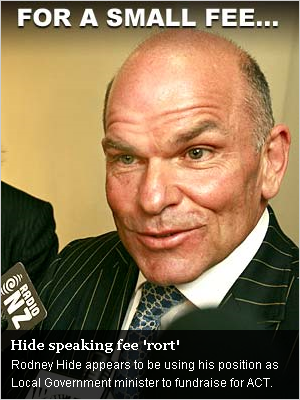The story of Rodney Hide’s ministerial fundraiser is making headway — at present, it’s the splash spot on stuff.co.nz and is pretty prominent on the Herald site as well.
This image is strong. Close-ups are rarely flattering, and this one has an unctuous, indignant defensiveness which evokes, well, just about every crooked politico in history. The text, leading with the universal refrain of officials on the take and following up hard with that beloved word ‘rort’, gives the audience all the necessary context. This is a position Hide has spent his political career avoiding, and one which he was once merciless in prosecuting. It’s a long way to fall.
It seems that the credit for this should go to Eddie, who drew together its various strands into the narrative we now have. It’s been picked up by a few blogs, including Red Alert, where Phil Twyford published his own clearly-derivative-but-not-attributed riff on the topic earlier today, complete with Goff’s press release which forms the basis for the NZPA story. And it looks like Eddie even chose the photo which Stuff ran with — only one is flipped on the vertical. Well done.
Update: Lyndon in the comments points out that the threads were in fact drawn together by North Shore mayor Andrew Williams in the first instance, and published on Scoop.co.nz – so Frist P0st credits there, although the Labour response seems more derivative of Eddie’s work than that, so my point largely remains.
L


